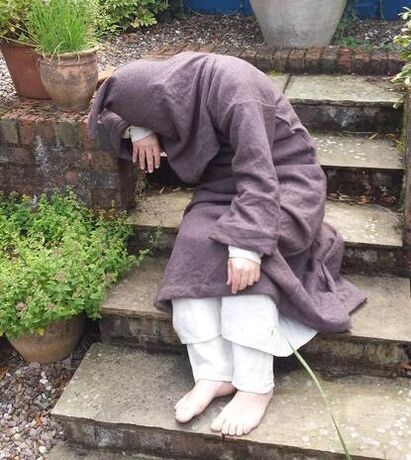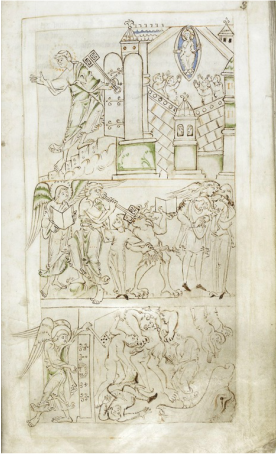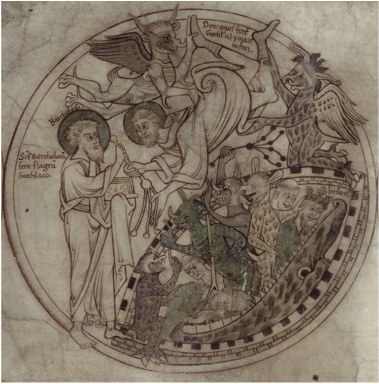12 Comments
Nic McNeil
28/11/2014 03:04:43 am
I've read some of these prescriptions from the penitentials before, but was really surprised to discover that 20 was considered the age of mental maturity. Correct me if I'm wrong, but I was under the impression that life expectancy in Early Medieval England was somewhere around 35. This guidance on is definitely in line with modern thinking on maturity and seems quite sensible, but it's quite disproportionate with the average life span. It seems to contradict some of the archaeological evidence from the earl period that associates even young boys with weapons and therefore some social responsibility. I wonder if this was a change in thinking brought about through Christian teaching. Have you come across any Christian doctrine which would support this?
Reply
Josiah
10/6/2017 06:41:30 am
That was an old average it counts infant death (which was common) modern estimates put the common age of death at around 64 once you reached 21
Reply
23/7/2018 07:52:36 pm
That is completely preposterous! Why is being a homosexual worse than being a murderer? It amazes just how horrible people can be. I do not understand why murder is acceptable and yet being a homosexual is not? There is nothing wrong with being gay. It is not stated in the Bible that Jesus hates gay people. People came up with that absurd idea because of their own selfish reasons and unreasonable judgment and I find it sick that people will criticize someone over that person's preference of gender.
Chris *The Anglo-Saxon Monk
28/11/2014 05:22:00 am
Thanks Nic for the comment. The age of 20 as the age of maturity is fairly typical of a monastic viewpoint. The archaeological evidence for young boys using weapons is not necessarily at odds. Perhaps what we are seeing here are two distinct, but concomitant, perspectives: a societal/cultural one where boys are old enough to wield a weapon, and an ecclesiastical one where moral/mental maturity is not arrived at so early in life. The penitentials evolved out of monastic life - their Irish origins indicate that quite clearly -- but they were adapted for lay life too. There are fairly consistent ideas about the relevance of various ages in male monastic environments throughout the early medieval period. Rob Meens article, ‘Children and Confession in the Early Middle Ages’, is helpful in this regard. It's found in the book, The Church and Childhood, ed. Diana Wood, Studies in Church History 31 (Oxford: Blackwell, 1994), pp. 53-65, at pp. 53-55. If you wish, I can also send you a section of my PhD thesis that deals with the age twenty, and provides an overview of various Irish and Anglo-Saxon penitential material on this. Just drop me an email (go to Contact Me) and I'd be happy to forward that to you.
Reply
Chris *The Anglo-Saxon Monk
2/12/2014 06:43:17 am
I meant to comment, Nic, on life expectancy in early medieval England. The assumption is sometimes made that the very low average life expectancy at birth meant that middle-aged or older people were either rare or even non-existent. However, a few things need to be born in mind: 1. High infant mortality rates bring down the average figure; 2. Population models indicate that even where mortality rates were severe, there would still have been significant numbers of people living past the age of life expectancy (e.g. even if 50% died by age thirty, 20% of a current poulation would be aged fifty or more); 3. Archaeological methods for dating adult human remains are not without their problems, so all life expectancy figures based on these should be understood to be approximate.
Reply
Aenne
29/7/2021 01:19:28 pm
This is addressed to Nic - you left a passionate defense in favor of same sex relations, but you left it from a modern viewpoint or perspective. The article that you responded to addresses views on homosexuality that were held by the Anglo-Saxons, centuries ago. The article doesn't say that these are or were "correct" views. Looking back on the social and religious norms that our ancestors held in the past is not "attacking" different views that many hold now. If anything, it puts them in perspective.
Reply
Christopher Monk
7/8/2021 11:06:13 am
Thanks for the comment. Absolutely spot on. As a historian of sexuality it's important to understand that explaining historical perspectives is not the same as expressing one's personal perspective. As it happens, my personal views couldn't be more opposed to early medieval ones.
Aenne
29/7/2021 01:21:42 pm
Sorry, re: the reply that I just left? I thought I was responding to "Nic" but now see that I was responding to "Best Essays". If you publish my reply, would you mind making this correction? Thanks.
Reply
Great post, Chris. Fascinating examples of penitentials. Women always seem to get the shaft from these…ahem…male clergymen passing down the penance! Still blaming Eve for leading Adam astray.
Reply
Chris *The Anglo-Saxon Monk
2/12/2014 06:36:22 am
Thanks, Char! Your questions at the end of your comment are certainly important ones. Particularly interesting is the issue of whether homosexuality may have been seen as not harming anyone. Laws against heterosexual adultery appear to emphasize the important status of the marriage union within society, and the importance of legitimate children within each union. Bearing children was, of course, one of the primary functions of married life. Even the Anglo-Saxon Church acknowledged that procreative sex within marriage was important, and not a sin. In fact, the Church even allowed a woman to abandon a husband who was found to be impotent (this is referred to in the penitentials). She had a right to bear a child, it would seem. Presumably, also, a man would want to ensure that any child his wife gave birth to was his own. The act of adultery by the wife could very well call into question the legitimacy of the child, and thus heterosexual adultery can be seen as potentially destabilising within a community. Perhaps, if we were to take the position that homosexual acts were tolerated, it may possibly be because homosexual sex does not relate to procreation, and thus it wasn't seen by itself as a threat to the stability of a procreative union. What do you think? What do others think?
Reply
Does this show the forward-thinking Anglo-Saxons exhibiting a separation of Church and State? (Is that more an American concept?) The Church condemned the act because the only 'natural' sex was for for procreation within a marriage. Church and State both punished heterosexual adultery for the reasons you note. But the government chose not to address homosexual behavior until the late 12th century - I certainly can't think of any other plausible explanation, but would love to hear others thoughts too.
Chris *The Anglo-Saxon Monk
4/12/2014 01:00:56 am
The relationship between Church and State in Anglo-Saxon England is complex. Certainly by the late AS period, we see very close ties. Wulfstan, the Archbishop of York, actually wrote several laws for both King Æthelred and King Cnut. Many of these have an ecclesiastical focus, showing concern for the security of the Church. In Cnut’s Oxford Code of 1018, Wulfstan emphasizes the duty of Christians ‘towards God and the world’, and incorporates very specific duties towards both the Church (e.g. keeping Sunday holy, holding to fasting on religious festivals, tithe payments, attending mass at least three times a year) and the community. On sexual matters, he legislates against prostitution, polygyny (having more than one wife) and marrying a kinsperson within six degrees of relationship. He reiterates the Church’s stand for priestly celibacy (this was a big issue for the Church at the time), and also requires a widow to wait a year before she decides to remarry. Notably, he includes adulterers (literally ‘marriage-breakers’; I personally think this is specifically referring to what we would now call bigamists) amongst those to be exiled if they do not make amends. Thus we can see that Wulfstan/Cnut’s lawcode is quite specific about certain sexual matters. But there are also some more general laws against sexual impropriety: abstaining from ‘unlawful/improper sexual unions’ (probably harking back to marrying close kin and bigamy) and ‘fornication’. The latter may have been interpreted by those enforcing the law as including the prohibition of homosexuality, but we can’t really state that for sure. What I find interesting about Wulfstan is that he is closely associated with one of the penitentials (known as the Old English Handbook for a confessor), which does stipulate against ‘foully polluting oneself in unnatural ways through any practice’. It’s clear that this is an allusion to things such as homosexuality and bestiality (in fact this penitentials does also have another canon specifically referring to bestiality); and it’s pretty clear Wulfstan knew what same-sex intercourse was, and most certainly he would have seen it as unnatural (as did other AS theologians). But perhaps when it came to writing Cnut’s laws, he was reluctant to be specific, and perhaps (who knows?) Cnut was too. Presumably he actually got to look over his own law!! I think we have to remember that Anglo-Saxon laws in general do not always stipulate everything in very exact terms; certain individual points of law are sometimes general and quite vague. In that way, they are unlike modern English (or US) law. It may be, in terms of secular law, that homosexual acts were not seen specifically as a major (or widespread) problem as was bigamy or marrying someone too close in kinship. Penitentials, the priests’ handbooks, on the other hand are quite often on sexual matters painfully specific, and this is because penitentials were all about sin. So, to sum up (sorry for going on so long), the ‘Church and State’ were at times tied at the hip, we might say, particularly late on in the Anglo-Saxon period, so I don’t see their relationship as the direct reason for the absence of legislation against homosexuality. I’m wondering as I conclude this whether the theological idea of inter-male sex as the ‘unspeakable sin’ filtered down into the psyche of Wulfstan, the legislator. But that’s for another time!
Reply
Your comment will be posted after it is approved.
Leave a Reply. |
Details
|



